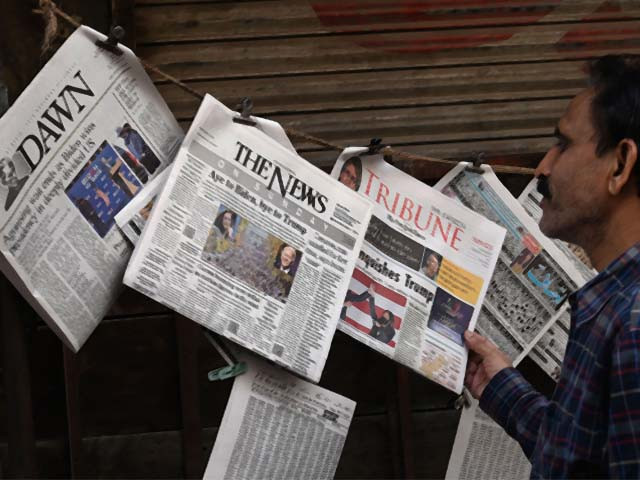The irony of writing an opinion piece about the transgressions of Pakistani opinion pieces is not lost on me. However, as a 23-year-old living in the era of information, the choice was between a polemic through one of my many social media accounts and a soberly presented argument on the very platform I wish to take on. With a greater chance of reaching my target – or targeted – audience, I chose the latter.
Pakistani newspapers have played a pivotal role in shaping public opinion over past decades. Speaking truth to power, they have held tyrants accountable for their oppression. The contributors to their opinion sections represent the peak of Pakistani intellect, seasoned professionals and intellectuals who provide a unique take on the world and its affairs. Their thought-provoking pieces instil a sense of curiosity in their readers, stimulating independent thought and intellectual growth.
Yet, the veracity of the above-mentioned description, especially of the esteemed Op-ed section, seems to be declining with each passing day. Today, Pakistani newspapers suffer from an epidemic – an epidemic of passable opinion pieces that rarely add to the intellect of its readers but meet the standard just enough to contribute to the on-going news cycle. Nothing exemplifies this claim more than the recent fixation with Afghanistan. Points that can be conveyed in a paragraph are stretched through repeated introductions, copied information, and banal jargon like the Afghan conundrum, dilemma, debate, discussion and whatnot.
This lack of originality in opinions has existed for a while now. Last year, the Foreign Affairs magazine published a piece outlining the effects of the Covid-19 pandemic on the global economy. Not a week had passed when a leading Pakistani newspaper published an opinion piece with the exact same title and borrowed content. More recently, another article by the Afghan President Ashraf Ghani appeared in Foreign Affairs. Unsurprisingly, another ‘opinion’ piece surfaced at a well-reputed newspaper doing nothing more than quoting – and I mean in inverted commas, not even paraphrasing – the content of President Ghani’s piece. And then there are ‘opinions’ that summarize reports, debates, and interviews, presenting them as the author’s profound wisdom – these can be easily replaced in the internet age with a single link to the source.
Of course, this does not mean that all published opinions are banal. There are many writers who do bring original ideas to the table and have garnered a well-deserved following for it. But even their work suffers from a deeply entrenched ideational shortcoming: a reactive approach towards contemporary affairs. These days, a significant chunk of opinions published by Pakistani newspapers are written in response to some domestic or international event. Instead of paving way for tangible progress, they only convey information that can also be found in news headlines. A fortnight ago, it was Prime Minister Imran Khan’s interview with Jonathan Swan. A week ago, it was the meeting of the National Security Committee. Today, it is Afghanistan – a topic that has been analyzed over and over again by the same writers to the point of redundancy. Naturally, the impacts of these pieces are as short-lived as the headlines they are based on. This reactive mindset has also crept into Pakistan’s policy-making apparatus whereby policies are only formulated after the occurrence of some headline-making incident, be it the attack on the Army Public School in Peshawar or the abduction of seven-year-old Zainab Ansari in Kasur.
Perhaps this reactive mind-set is a result of groupthink developed due to an absence of fresh blood among opinion writers. In a country with a median age of 23 years, one expects that young voices would often make it to the opinion sections of leading newspapers. But is that the case? One must agree that the old guard’s reputation and experiences add credibility to their opinions. But are all pieces written by them – and published abundantly by Pakistani newspapers – such original and thought-provoking commentaries that they cannot be replaced? More importantly, by limiting the scope of its contributors to certain experts and retired professionals, have Pakistani newspapers limited their audiences to them as well?
Since young authors, particularly from Generation Z, are not adequately represented in print media, the issues that concern them remain neglected in newspapers. This lack of relevance translates into lower readership among young audiences, casting doubt on the future of newspapers. The youth can do without getting their opinions published in leading newspapers – the internet provides many opportunities for them to get their voices heard. However, newspapers cannot afford to ignore a majority that has the potential to initiate their revival or exacerbate their decline.
It goes without saying that despite its mentioned flaws, print media has rendered great service to the public over the years. But the quality of that service has suffered recently due to a lack of originality, proactivity, and diversity. While print media speaks truth to power, it must also speak truth to itself. It needs to address its shortcomings as if its survival were at stake – because it actually is.



COMMENTS
Comments are moderated and generally will be posted if they are on-topic and not abusive.
For more information, please see our Comments FAQ